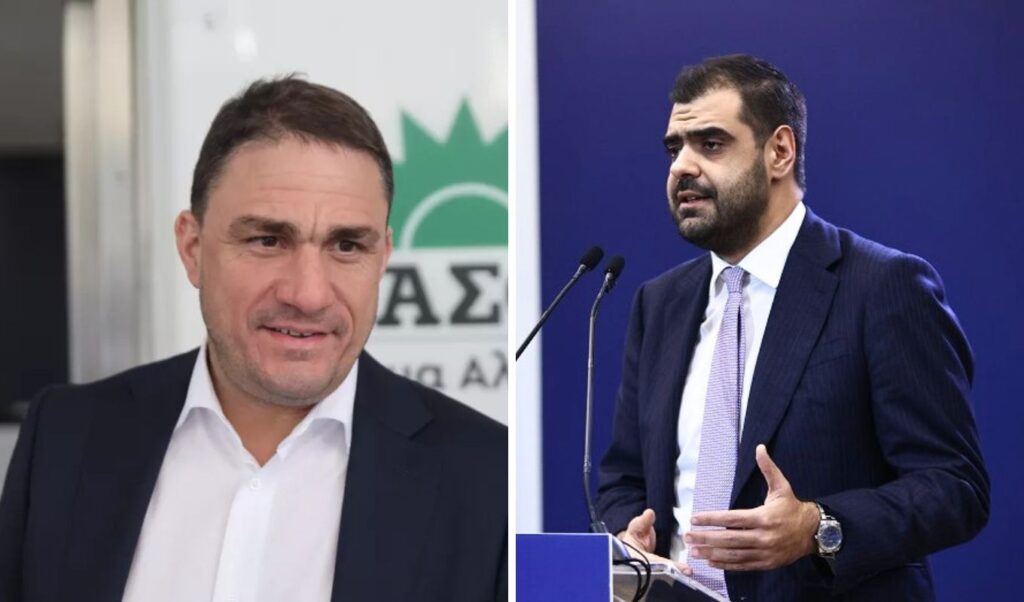Three questions for PASOK are posed by Deputy Minister to the Prime Minister and government spokesperson Pavlos Marinakis, responding to the statement by Charilaou Trikoupi street press spokesperson Kostas Tsoukalas.
It should be recalled that Mr. Tsoukalas, commenting on Kyriakos Mitsotakis’s weekly review, accused the government of “exchanging citizens’ economic hemorrhaging with crumbs“.
In his statement, Mr. Marinakis emphasized that the government has proceeded with 72 reductions or abolitions of direct and indirect taxes since 2019, including property tax (ENFIA), income tax, and insurance contributions, while “not a single tax rate has been increased“, with the sole exception being ENFIA for banks’ closed properties, which will be implemented from 2026.
Responding to criticism about increased tax revenues, he noted this is a natural result of reduced unemployment, economic growth, and tax evasion combat. “Even a first-year university student knows how taxes can be reduced while revenues increase“, he added pointedly.
The government spokesperson accused PASOK of, like SYRIZA, demanding additional support measures while simultaneously denouncing increased revenues, asking “where will these measures be funded” and whether “Mr. Androulakis discovered money trees“.
“The country has paid dearly for political opportunists’ experiments” he noted, adding that the government will continue emphasizing the middle class, unemployment reduction, and permanent social support.
Full statement by Pavlos Marinakis
From today’s statement by PASOK’s press spokesperson regarding the Prime Minister’s weekly post, three legitimate questions arise:
First, is PASOK aware of any tax the government has increased, or is it deliberately lying to citizens?
The New Democracy government, from 2019 to today, has reduced or abolished 72 direct and indirect taxes. We remind, among others, significant reductions in property tax and income tax for households and businesses, abolition of the solidarity contribution for employees and the professional fee for freelancers, reductions of nearly 6% in insurance contributions, reduced VAT for agricultural machinery, transportation, abolition of parental gift tax up to 800,000 euros for first-degree relatives, etc.
Conversely, not a single tax rate has been increased, except for the ENFIA increase from 2026 for banks’ and funds’ closed properties to make them available to the market.
Kyriakos Mitsotakis’s government believes in tax reduction and will continue doing so, as citizens justifiably demand, emphasizing the middle class.
Second, does PASOK understand the difference between tax rates and tax revenues?
In simple terms, even a first-year economics university student knows that taxes can be reduced while tax revenues simultaneously increase. We’ve implemented this policy since 2019, and increased revenues with reduced rates are due to three basic reasons:
– Unemployment reduction, as 500,000 citizens now have jobs and while as unemployed they were paid by the state through unemployment benefits, they now contribute to revenues through taxation and insurance coverage.
– Tax evasion combat with significant results for public revenues and
– Economic development, given that our country has one of the highest growth rates in the European Union.
Third question: how is it possible for PASOK, following SYRIZA’s example, to demand the government proceed with additional support measures while simultaneously denouncing increased state revenues?
Where will these measures be funded? SYRIZA didn’t find the “money trees” it promised. Did Mr. Androulakis and his party “discover” them?
Our country has paid very dearly, for entire decades, the price of “apprentice sorcerers” and political opportunists, who played with citizens’ anxieties, distributing money that didn’t exist and giving “unfunded” promises. We certainly still have much road to travel, since no one claims there aren’t still significant problems we must address, with the increased cost of living being first and foremost.
The only way to continue covering the distance separating us from the rest of Europe, regarding citizens’ disposable income, is to continuously grow the “pie” through unemployment reduction, economic development, and tax evasion combat, and then apply permanent social support measures, and this is what we will continue doing.
Kostas Tsoukalas: Government exchanges citizens’ economic hemorrhaging with crumbs
Mr. Tsoukalas’s comment had preceded, supporting that citizens know “the government exchanges their economic hemorrhaging with crumbs“. As he states, the 1.2 billion euro surplus target overshoot during January-July “resulted from tax raids against the middle class and working people“.
Specifically, Mr. Tsoukalas stated that “the Prime Minister celebrates the 1.2 billion euro overshoot of the primary surplus target during January-July. A surplus resulting from tax raids against the middle class and working people through indirect and direct taxation“.
“During 2020-2024, tax burdens increased five times more than the nominal increase in wages and pensions. Mitsotakis’s super-surpluses are money missing from the market. Greek tourism experienced this firsthand this year“. He argues that “this is why his celebrations are out of place and time both regarding society’s needs and his policy’s dead ends“, he added.
“As for his claim that ‘we have an economy that produces benefits, which are returned to society’“, he commented further, concluding that “he directly underestimates citizens’ intelligence, who know the government exchanges their economic hemorrhaging with crumbs“.




